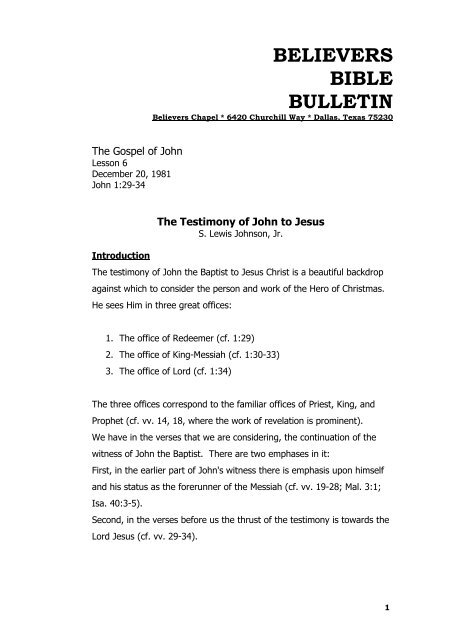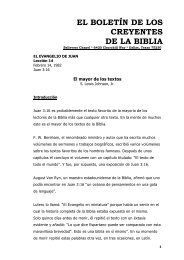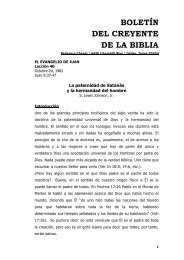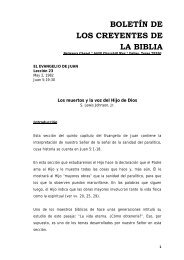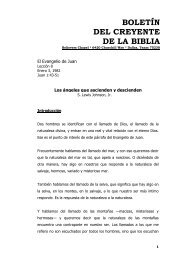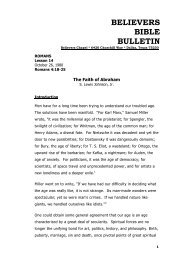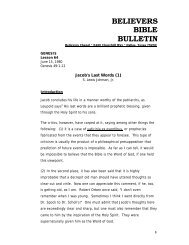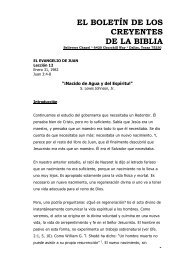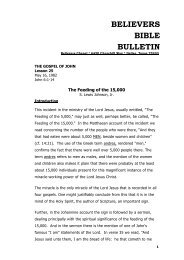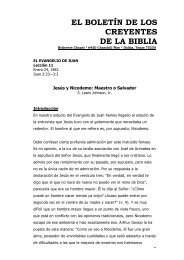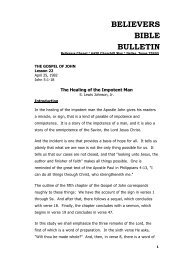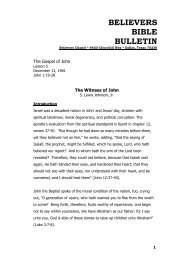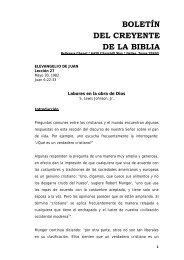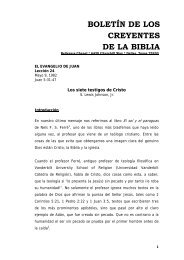John 1 29-34.pdf - Believers Chapel
John 1 29-34.pdf - Believers Chapel
John 1 29-34.pdf - Believers Chapel
Create successful ePaper yourself
Turn your PDF publications into a flip-book with our unique Google optimized e-Paper software.
BELIEVERS<br />
BIBLE<br />
BULLETIN<br />
<strong>Believers</strong> <strong>Chapel</strong> * 6420 Churchill Way * Dallas, Texas 75230<br />
The Gospel of <strong>John</strong><br />
Lesson 6<br />
December 20, 1981<br />
<strong>John</strong> 1:<strong>29</strong>-34<br />
Introduction<br />
The Testimony of <strong>John</strong> to Jesus<br />
S. Lewis <strong>John</strong>son, Jr.<br />
The testimony of <strong>John</strong> the Baptist to Jesus Christ is a beautiful backdrop<br />
against which to consider the person and work of the Hero of Christmas.<br />
He sees Him in three great offices:<br />
1. The office of Redeemer (cf. 1:<strong>29</strong>)<br />
2. The office of King-Messiah (cf. 1:30-33)<br />
3. The office of Lord (cf. 1:34)<br />
The three offices correspond to the familiar offices of Priest, King, and<br />
Prophet (cf. vv. 14, 18, where the work of revelation is prominent).<br />
We have in the verses that we are considering, the continuation of the<br />
witness of <strong>John</strong> the Baptist. There are two emphases in it:<br />
First, in the earlier part of <strong>John</strong>'s witness there is emphasis upon himself<br />
and his status as the forerunner of the Messiah (cf. vv. 19-28; Mal. 3:1;<br />
Isa. 40:3-5).<br />
Second, in the verses before us the thrust of the testimony is towards the<br />
Lord Jesus (cf. vv. <strong>29</strong>-34).<br />
1
JESUS AS THE LAMB OF GOD<br />
The term "Lamb of God". There are many different views of the<br />
precise force of the expression, "Lamb of God." For example, Leon<br />
Morris in his excellent commentary on the Gospel of <strong>John</strong> discusses nine<br />
of the various views of the term, opting for a tenth and different view! 1<br />
There are three views that may be called prominent views of the term:<br />
• First, the term is sometimes referred to the apocalyptic lamb (cf.<br />
Rev. 7:17; 17:14), meaning the Lord Jesus as He appears in the<br />
last scenes of the age, in the Book of Revelation. It is doubtful<br />
that that is the meaning that <strong>John</strong> attaches to the term here, for<br />
the Greek word used for lamb in the Apocalypse is a different one<br />
from the term used here. And, further, the work of the Lamb in<br />
Revelation is not as clearly and fully directed toward the work of<br />
salvation as it is here.<br />
• Second, the term is often referred to the paschal lamb, that is, the<br />
Passover lamb, our Lord being seen as the antitype of the<br />
Passover lamb of Israel. In support of this one might cite <strong>John</strong><br />
19:36 and Revelation 5:6, 9. I think it is clear that this concept is<br />
involved in an understanding of the term, but I am not at all sure<br />
that this is the source of <strong>John</strong>'s use of the term.<br />
• Third, there are commentators and students of the gospel that<br />
refer the term to the use of the term in the great passage on the<br />
Suffering Servant in Isaiah 53:7. There we read, "He was<br />
oppressed, and he was afflicted, yet he opened not his mouth; HE<br />
IS BROUGHT AS A LAMB TO THE SLAUGHTER, and as a sheep<br />
before her shearers is dumb, so he openeth not his mouth."<br />
Isaiah 53 is the culmination of the Old Testament teaching on the<br />
lamb as the type of the ministry of the Lord Jesus Christ. In my<br />
opinion, the teaching originated at least as early as Genesis 22:8<br />
in Abraham's offering of Isaac and was developed quite fully in<br />
Exodus 12:1-13 in the account of the sacrifice of the Passover<br />
lamb by Israel in Egypt. That line of teaching reaches its climax in<br />
Isaiah 53. Incidentally, the word amnos, meaning lamb, is found<br />
2
in Isaiah 53:7, and that is the word found in <strong>John</strong> 1:<strong>29</strong>, 36 (cf.<br />
Acts 8:32-33).<br />
The Baptist saw himself as the herald of Isaiah 40:3, and it would be<br />
natural for him to have Isaiah 53:7 in mind in the use of his reference<br />
here. If we could prove Isaiah fifty-three rested on Exodus twelve, then<br />
it would be plainer that <strong>John</strong> 1:<strong>29</strong> is simply a development of the Old<br />
Testament teaching. That is my view of it, but I am not sure that it can<br />
be proved. It certainly seems likely. We do know that <strong>John</strong> the Apostle<br />
did see the Lord as the Passover sacrifice, for he makes reference to that<br />
in <strong>John</strong> 19:36. And, further, we also know that the Synoptic Gospels link<br />
the Passover Supper with the Suffering Servant of Jehovah (cf. Matt.<br />
26:26-28; Isa. 53:11-12).<br />
The details of the text (<strong>John</strong> 1:<strong>29</strong>). We shall have space only for a<br />
notice of a few of the aspects of the text. In the first place, the use of<br />
the term "taketh away" is a reference to penal substitution. He bears<br />
away the sin of the world by simply bearing it, that is, paying its penalty. 2<br />
In the second place, it is instructive to note that <strong>John</strong> uses the word<br />
"sin," not "sins." Of course, the use of the term "sins" would be perfectly<br />
all right (cf. 1 <strong>John</strong> 3:5), but the emphasis here rests upon the nature of<br />
the guilt, and not upon the individual acts that produce it. The sin of the<br />
world is unbelief and, in the light of the progress of revelation, more<br />
specifically now unbelief in the Son of God (cf. <strong>John</strong> 16:8-9). This is the<br />
essence of sin, and it is this that led Adam and Eve to partake of the<br />
forbidden fruit. Before they actually ate, they had sinned by the unbelief<br />
that led them to the act.<br />
Unbelief is characteristic of the whole world and accounts for the cruelty<br />
of the jungle, that jungle which man has made of his universe. In the<br />
animal jungle each animal follows its own appetite, paying no attention<br />
whatever to the general good of other animals. In man the law of the<br />
jungle is much more virulent, being a law consciously and willfully<br />
obeyed. No one individual, other than our first father, is responsible for<br />
3
it, but we are also responsible for we stood in him as our federal head<br />
(cf. Rom. 5:12-21; 1 Cor. 15:21-22). As a judgment upon Adam and his<br />
seed, sin has become also an "infection of nature" (cf. Article IX of the<br />
Thirty-Nine Articles of Religion). Thus, we are guilty for Adam's first sin,<br />
and we are guilty for we bear a nature infected by sin. It sets us against<br />
God and men. This the Lamb of God has borne for the people of God,<br />
and they go free by the forgiveness of sin and justification of life.<br />
Is it not amazing to find men and women in our society denying the fall<br />
of man. Can anything be more easily substantiated Clarence Edward<br />
Macartney in one of his books comments, "If I were to take a visitor to<br />
Pittsburgh down to yonder 'Point ' to show him where the two rivers<br />
mingle their waters to form the Ohio, and, looking about, he were to ask,<br />
'Where are the rivers' that would be like a man hearing a sermon on the<br />
fall of man and asking, 'Where are the signs of the fall Where are the<br />
fallen men' "<br />
Among the evidences of the Fall are the universal tradition of it, reflected<br />
in the stories of Pandora's Box, the apples of Hesperides, and Apollo and<br />
the Python, the strange persistence and endurance of evil, the system of<br />
education, which testifies to the fact that man has a nature that makes<br />
him a menace to society if untrained, and all government, which bears<br />
witness that human nature must be restrained. "The sea of humanity<br />
today heaves and tosses," Macartney also remarks, "casting up its mire<br />
and dirt. We see evil entrenched in our cities. We see it attack our best<br />
institutions. We see it in our own hearts."<br />
In the third place, <strong>John</strong> cries that Jesus is the Lamb of God that takes<br />
away the sin of "the world." This part of his testimony is often<br />
misunderstood. It is taken to mean that the Lord Jesus came with the<br />
intention of paying the penalty for the sin of every individual man. If that<br />
were so, and if He really did that, then how can heaven bring any further<br />
charge against those whose sins he covered with His blood He would<br />
have offered a substitutionary death that was not really substitutionary,<br />
only conditionally so. And there is no text in the New Testament that<br />
4
says that He died a conditionally substitutionary death (cf. Gal. 3:13; 4:1-<br />
7; 2 Cor. 5:12-21; Rom. 3:24-25, etc.). No, the reference in the word<br />
"world" is to the universal reference of the atonement nationally. It is an<br />
atonement that is for Gentiles as well as Jews; an atonement for all men<br />
without distinction, but not all men without exception. The emphasis<br />
upon the world of our Lord as applying not only to the Jews but also to<br />
the Gentiles is seen in this very context (cf. v. 31) and in other contexts<br />
of the gospel (cf. 4:22, 42).<br />
On the way to the top of Moriah, Isaac had said to his father, "My<br />
father," and Abraham had answered, "Here am I, my son." Then the<br />
young man had asked, "Behold the fire and the wood: but there is the<br />
lamb for a burnt offering" Abraham replied, "My son, God will provide<br />
himself a lamb for a burnt offering" (cf. Gen. 22:7-8). The ultimate,<br />
reference of Abraham's words is the Lamb of God, the Lord Jesus Christ,<br />
announced by <strong>John</strong> the Baptist and crucified for the sins of His people.<br />
JESUS AS THE KING-MESSIAH<br />
His pre-existence (<strong>John</strong> 1:30). In this verse, the Baptist again<br />
proclaims the pre-existence of the Lord Jesus. The apostle may have<br />
included this as part of a polemic against Baptist sectarians who were<br />
claiming superiority for <strong>John</strong> the Baptist, since their master came first.<br />
There is no certainty of this, however. 3 5<br />
His purpose in coming (<strong>John</strong> 1:31). <strong>John</strong> adds, "And I knew him<br />
not," to some a rather difficult comment, since <strong>John</strong> must have known his<br />
kinsman. The Greek word rendered here by "knew" is one that stands for<br />
the knowledge of a truth rather than of a person, generally speaking.<br />
The Baptist had known Jesus of Nazareth, but he had not known what he<br />
learned at His baptism, namely, that He was the Messiah, and he had not<br />
known what manner of Messiah He would turn out to be. 4 The Baptist<br />
adds that he baptized that He should be made manifest to Israel, a<br />
statement that confirms an important teaching of the New Testament. In
His ministry the thrust of it was, in accordance with the Old Testament<br />
teaching, to confirm the promises made to the fathers, laying the<br />
foundation for the confirmation and inauguration of the entire covenantal<br />
revelation made to Abraham, David, and Jeremiah (cf. Matt. 10:5-6;<br />
15:24; Rom. 15:8).<br />
His Messiahship (<strong>John</strong> 1:32-33). The fact that the Holy Spirit came<br />
to rest upon Him (the aorist tense of the verb rendered "remaining" has<br />
the force of came to rest) was the indication that He was the one who<br />
would baptize with the Holy Spirit, and not with water. In other words, it<br />
was the indication that He was the Messiah. The anointing with the Holy<br />
Spirit was the prophesied enablement of the Messiah (cf. Isa. 42:1; 61:1;<br />
11:2; cf. Matt. 3:17). The words spoken to Him at His baptism by <strong>John</strong>,<br />
"This is my beloved Son, in whom I am well pleased," forecast His future<br />
as that of a Suffering King, a Priest-Victim who would offer the one<br />
redemptive sacrifice and then reign in the power of it over His kingdom.<br />
JESUS AS THE SON OF GOD<br />
The textual problem. The final comment of <strong>John</strong> the Baptist is, "And I<br />
saw, and bore witness that this is the Son of God." It is the climactic<br />
testimony in the apostle's eyes, since that is his purpose, to bring men to<br />
faith in the Lord Jesus as the Messiah and the Son of God (cf. 20:30-31).<br />
<strong>John</strong> simply repeated what was implicit in the statement of the Father<br />
from heaven, "This is my beloved Son" (cf. Luke 3:22). Some of the<br />
ancient manuscripts read instead of "the Son of God," "the Elect of God."<br />
It is possible that some early scribe, followed by others, changed this<br />
reading to "Son of God," because that is more harmonious with other<br />
Johannine material, but it is probably more likely to be an error, perhaps<br />
derived from reflection upon the Father's voice at the Transfiguration,<br />
and the knowledge that beloved and elect were often equivalents in<br />
Rabbinic literature (cf. Luke 9:35). The older and more diverse witnesses<br />
to the text here have Son, and that is to be preferred, it seems to me.<br />
6
The meaning of Son of God. The term, "Son of God" is a term of<br />
deity, indicating that the Son possesses the nature of the Father. In fact,<br />
it suggests an even more authoritative significance as the following text<br />
indicates, "All things are delivered unto me by my Father, and no man<br />
knoweth the Son, but the Father; neither knoweth any man the Father,<br />
except the Son, and he to whomsoever the Son will reveal him" (Matt.<br />
11:27). It is the Son who has exclusive knowledge of the Father, direct<br />
and unmediated, just as the Father has of the Son. And, further, He is<br />
the sovereign mediator of the knowledge of the Father, giving that<br />
knowledge to those whom He wills to give it (cf. <strong>John</strong> 6:46; 10:15).<br />
In another place He points out that it is the Father's intention that all<br />
men honor the Son just as they honor the Father; amazing thought,<br />
indeed (cf. <strong>John</strong> 5:23).<br />
"It has been said that, in order to give us authentic tidings of God, Jesus<br />
did not have to be God," Donald Baillie wrote. "But, if Jesus only came<br />
from a distant realm to give us tidings about God, then He was wrong<br />
about Him, for He takes no initiative toward us. We can never really<br />
know that God wishes to come to us and for us if it is not God who<br />
comes in Jesus. It is <strong>John</strong>'s assertion that God has come in Jesus, and,<br />
therefore, in Him we have the exegesis of the Father." 5<br />
Conclusion<br />
<strong>John</strong> the Baptist, then, is the first of a long line of New Testament<br />
witnesses to the Sonship of Jesus Christ, although there are suggestions<br />
of a similar testimony in that of Anna and Simeon. The Sonship is unique<br />
and royal. The passage is also important for the insight it gives into the<br />
need of men. The Lord Jesus is proclaimed as the Lamb of God that<br />
takes away sin, and that surely is our need. In <strong>John</strong>'s great "behold" our<br />
need is met. May the Lord enable us to appropriate Him. May He<br />
become OUR Sin-bearer!<br />
1 Morris, pp. 144-148.<br />
Footnotes<br />
7
2 Ibid., p. 148.<br />
3<br />
Brown, p. 64.<br />
4 Temple, p. 25.<br />
5 D. M. Baillie, God Was in Christ (New York: Charles Scribner's Sons, 1948), pp. 64-65.<br />
8


